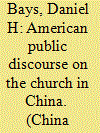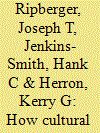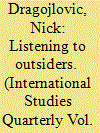|
|
|
Sort Order |
|
|
|
Items / Page
|
|
|
|
|
|
|
| Srl | Item |
| 1 |
ID:
085315


|
|
|
|
|
| Publication |
2008.
|
| Summary/Abstract |
Despite the increasing integration of markets, most political scientists contend that governments retain much policy "room to maneuver." Moreover, citizens presumably support further economic integration because they believe their governments can cushion the impacts of market forces. In this sense, globalization is compatible with democracy. Rarely, however, are data provided that demonstrate citizens' appreciation for the room to maneuver, let alone their positive evaluation of it. Who do citizens identify as most responsible for the performance of the U.S. economy, elected officials or national and international market forces? Which citizens attribute economic performance to these forces and not to their elected officials? In this article, we report results from an original experiment designed to answer these questions. We find that a good number of Americans believe that their government retains the room to maneuver. However, there exists a substantial minority that does not. We show, consistent with recent developments in the study of political psychology on distal associations and partisan motivated reasoning, that this minority is characterized according to partisanship, knowledge levels, and age. Republican partisans and more educated citizens believe there is less room to maneuver than Democratic partisans and members of older age cohorts. Generational factors also shape beliefs in the efficacy of policy control. Finally, priming subjects to think about economic globalization does not affect their responsibility attributions. The choice set matters, however. When provided the option, a significant number of respondents assign responsibility to market forces rather than elected officials.
|
|
|
|
|
|
|
|
|
|
|
|
|
|
|
|
| 2 |
ID:
092575


|
|
|
| 3 |
ID:
125179


|
|
|
|
|
| Publication |
2013.
|
| Summary/Abstract |
The role of Hollywood films in holding up a mirror-albeit sometimes a distorted one-to the American public is indisputable. Less discussed is their role in bringing a wide range of music-popular, classical, jazz, avant-garde, ethnic-to an unsuspecting audience. Whether the music is in the foreground, as in biographical movies about composers, for example, or in the background supporting the narrative, watching a movie educates the viewers' ears. Indeed, the role of movies in widening the public's aural palate has parallels with the role of art museums in broadening the public's visual taste. To supply the music needed for movies, Hollywood studios have employed a large number of composers of the most varied backgrounds, taking on a significant function as patron of contemporary music. This essay briefly examines some of the varied interactions of movies, music, and the public.
|
|
|
|
|
|
|
|
|
|
|
|
|
|
|
|
| 4 |
ID:
110650


|
|
|
|
|
| Publication |
2011.
|
| Summary/Abstract |
Scholars have used cultural theory (CT) to explain risk perceptions and opinion formation across an impressive array of public issues, ranging from environmental, regulatory, and energy policy to public health and economics. Although disparate, all these issues concern domestic policies. This article breaks with this trend by exploring the extent to which CT can help scholars better understand public beliefs about national security. Of critical importance in debates about national security are perceptions of individual versus collective threat and the appropriate role of authoritative institutions in protecting society from these threats. Because CT provides a framework that explicitly addresses these dimensions, national security issues provide an illuminating canvas for evaluating the theory's explanatory utility.
|
|
|
|
|
|
|
|
|
|
|
|
|
|
|
|
| 5 |
ID:
138300


|
|
|
|
|
| Summary/Abstract |
Does nationality disadvantage foreign actors when they attempt to persuade the American public? Using data from an online survey experiment administered to a sample of US citizens, we find that the nationality of British and French advocates only reduces persuasiveness among American Republicans with low levels of political awareness. Among American Democrats, credible French or British advocates can be more persuasive than a comparable American source. Overall, foreign messengers from friendly countries are not disadvantaged by nationality, as nationality has low political salience and other domestic characteristics (such as partisanship) dominate subjects' heuristic processing. When a foreign advocate's nationality does play a role, however, it is likely to lead to polarization in domestic audience attitudes.
|
|
|
|
|
|
|
|
|
|
|
|
|
|
|
|
|
|
|
|
|